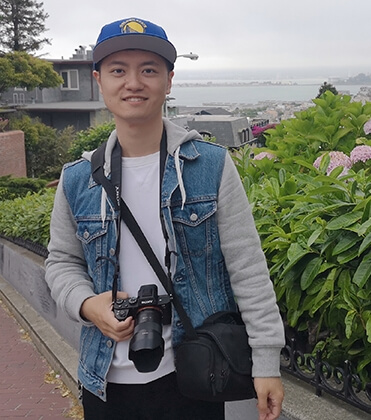News
Yuliang Li
Yuliang Li and Andrew Ross have received the second annual Computer Science Outstanding Ph.D. Dissertation Awards from the Harvard John A. Paulson School of Engineering and Applied Sciences.
Li's dissertation, titled "Hardware-Software Codesign for High-Performance Cloud Networks," explores the use of emerging hardware in the cloud, and jointly designs software systems with this hardware to improve performance and robustness of cloud networks.
As Moore's law has come to an end, pure software solutions can no longer keep up with the exponentially increasing amount of data and processing required. On the other hand, hardware, although fast, is limited to only simple, special-purpose tasks. Li's research marries the high speed of hardware with the general purpose of software to significantly improve the performance and robustness of cloud networks. Li’s work was also honored with the 2020 Association for Computing Machinery's (ACM) Special Interest Group on Data Communications Doctoral Dissertation Award.
He will join the Network Infrastructure team at Google Cloud, continuing his dissertation topic to build high-performance cloud networks by hardware-software codesign.
“Yuliang's thesis work made significant contributions to improve the performance and robustness of cloud networks,” said Li’s advisor, Minlan Yu, Associate Professor of Computer Science. “Today, the hardware layer in cloud networks is evolving quickly with more programmable switches and network interface cards (NICs) and higher speed. But we lack the software to best leverage and coordinate these emerging hardware. Yuliang takes an approach of hardware and software codesign and made architectural insights on identifying the best division of labor between programmable switches, NICs, hosts, and the controller.”
Andrew Ross
Ross’ dissertation, titled “Right for the Right Reasons: Training Neural Networks to be Interpretable, Robust, and Consistent with Expert Knowledge,” explores different ways of optimizing machine learning models to make predictions for better reasons. Usually, researchers teach machine learners by feeding them numerous examples of questions and associated answers, and then ask them to answer new questions. By contrast, when people teach human learners, they usually provide them with reasons as well as examples because teaching solely by example can produce ambiguity—there can be multiple procedures that arrive at the same answer, even if only one will work in practice.
When neural networks are faced with that kind of ambiguity, they often fail or end up being untrustworthy in real-world situations. Ross’ work focuses on ways of encoding extra information about "the right reason" into the process of training neural networks, so that what they ultimately learn is more robust to differences between conditions during learning and conditions in practice.
Ross will pursue a postdoctoral fellowship in interpretable machine learning for climate modeling at New York University.
“Andrew's thesis looks at interpretability in machine learning from such a variety of angles. His work on jointly optimizing for interpretability and accuracy, and connections between interpretability and robustness, has catalyzed numerous recent extensions,” said Ross’ advisor, Finale Doshi-Velez, the John L. Loeb Professor of Engineering and Applied Sciences. “I'm often hearing from colleagues how much they love the work. He's also worked on the human side, designing ways to measure the interpretability—or understandability—of generative models. That work received an honorable mention at ACM Conference on Human Factors in Computing Systems (CHI) this year.”
The Computer Science Outstanding Ph.D. Dissertation Award at SEAS was launched in 2020 to recognize the most outstanding Ph.D. dissertations of the year. A committee of faculty chose the winners from a group of students who were nominated based on input from all graduating students’ Ph.D. committees. The award evaluates each dissertation as a cohesive body of work, and looks at research quality, potential impact, and quality of presentation.
Topics: Awards, Computer Science
Cutting-edge science delivered direct to your inbox.
Join the Harvard SEAS mailing list.
Press Contact
Adam Zewe | 617-496-5878 | azewe@seas.harvard.edu




